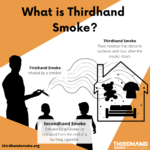A new study investigating the effect of thirdhand smoke (THS) in a mouse model system specially designed to mimic the genetic diversity of human populations has shed new light on how genetic predispositions contribute to an individual’s cancer risk. This work is an instrumental step towards building a more realistic understanding of how tobacco smoke residue could impact cancer risk in people.
Machine Learning Helps Link Chemical Exposure and Obesity
Scientists at Berkeley Lab and their collaborators developed a machine learning technique to discover obesity-related mixed chemical exposure patterns associated with environmental health risk in the general U.S. population. To assess this, they used indicators like body mass index and waist circumference.
Thirdhand Smoke Harms the Body More Than We Ever Realized
A new study found that concentrations of toxic chemicals lingering indoors where cigarettes have been smoked can exceed risk guidelines from the State of California. This means that non-smokers can be exposed to health risks by living in contaminated spaces.
Trio of Recent Studies Underscore Harms of Exposure to Thirdhand Smoke
The thirdhand smoke (THS) research group in Biosciences’ Biological Systems and Engineering (BSE) Division contributed to three recently-published studies that further underscore the harms of exposure to the lingering toxic residues from tobacco smoke.
Microbiome Signature Could Predict Post-op Enterocolitis in Hirschsprung Disease Patients
Biosciences Area researchers, in collaboration with colleagues at Nanjing Medical University in China, performed the first study to prospectively investigate the gut microbiome in relation to Hirschsprung-associated enterocolitis (HAEC), a leading cause of death in Hirschsprung disease patients. They identified a microbiome signature that might predict the development of postoperative HAEC. In addition, they found that exclusive breastfeeding might reduce the risk of HAEC through modulation of the intestinal microbiome.
Was this page useful?








